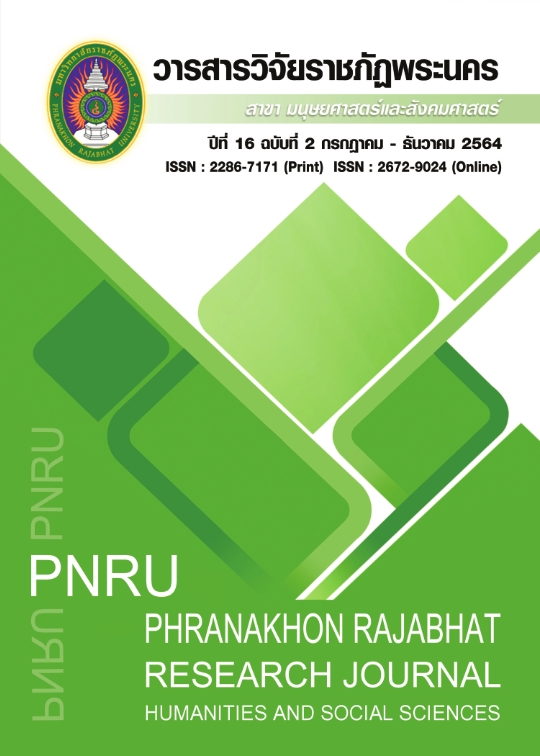REFLECTIONS ON THE SOCIAL CONTEXT FROM LYRICS IN LUK THUNG SONG OF KRU PHAIBOON BUTKHAN
Main Article Content
Abstract
This research used qualitative research methodology. The objective was to study the social context reflection from lyrics in the Luk thung song of Kru Phaiboon Butkhan, namely the songs’ meaning, the reflection on concrete and abstract cultures, and the literary value. The result showed that 1) the “Kha Namnom” song has the meaning of the mother’s grace remembrance. For the concrete, the lifestyle and motherhood roles were reflected. For the abstract, the value of gratitude was reflected. For the literature, the moral value was shown. 2) the “Chai Sam Bot” song expresses the condolences of the man ordained three times. For the concrete, the practice of avoiding being ordained three times was reflected. For the abstract, the values of being ordained as a monk and the belief in the devil's adventures were reflected. For the literature, the value of critical skills was shown. 3) the “Lok Ni Khue Lakhon” song expressed the metaphorical meaning of human life as a drama that ended in death. For the concrete, the roles and truths of life were reflected. For the abstract, uncertain happiness and suffering were reflected. For the literature, the intellectual value was shown. And 4) the “Bupphesanniwat” song has the meaning of flirting with young women. For the concrete, the merit-making of Thai Buddhists was reflected. For the abstract, the belief about merit-making in past life was reflected. For the literature, the moral value was shown. Most of the lyrics expressed human emotions and feelings in an easy-to-understand language that made the audience imaginative and aesthetically approachable.
Article Details
Each publish articles were copyright by Phranakorn Rajabhat University
Any contents which appeared in each articles in the journal were authors personal opinion. It did not relate to Phranakorn Rajabhat University and other instructors in the university. Each authors would take responsibility on their articles. If there are any mistake, the authors will take responsibility themselves
References
Pewpowsuay, P. (2006). Isan Luk Thung Song and Characteristics of Language Use and Reflection of Local Culture. Full story of the 44th Academic Conference of Kasetsart University (pages 520-528).
Piromnukul, R. (2017). “Commentary for Mahakan Sutra Sungkaya Sutra in Scriptures of the Middle Ages” (Online). Avaiable//https://www.matichon.co.th/education/news_626823.
Punyakhetthikul, N. (2014). Paiboon Butkhan and the Social and Cultural Wisdom Appearing in Thai Lukthung songs. Bangkok: Phranakhon Rajabhat University.
Royal Academy. (2013). Dictionary, Royal Institute Edition 2011. Bangkok: Siri Wattana Interprint.
Theparat, A. (2006). Considering the value of literature. (Online). http://www.thaigoodview.com/library/teachershow/chanthaburi/aumara_t/index.html.
Thienthavorn, W. (2017). Buppesanniwat. (Online). Avaiable//https://www.matichon.co.th/ columnists/news_506681.
Vejcho, P. (2018). Folklore. Yala: Yala Rajabhat University.
Wanyangkun, W. (2012). Competent author Lukthungphaiboon Butkhan. (4th printing). Bangkok: Freeform Publishing.
Youtube.com. (2016). Bupphesanniwat. (Online). Avaiable//https://www.youtube.com/watch?v =r0h4WIzVbc4.
Youtube.com. (2016). Chai Sam Bot. (Online). Avaiable//https://www.youtube.com/watch?v =6lgQgsSIbqY.
Youtube.com. (2018). Kha Namnom. (Online). Avaiable//https://www.youtube.com/watch?v=FWSP znEQhnc.
Youtube.com. (2015). Lok Ni Khue Lakhon. (Online). Avaiable//https://www.youtube.com/ watch?v=WQJiBJ2tVWI.


